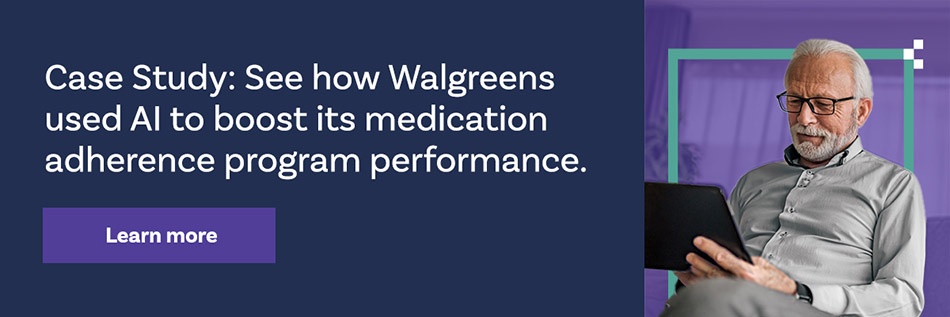Diabetes is the seventh leading cause of death in the United States. Despite this grim statistic, diabetes medication adherence rates are surprisingly low, especially given that diabetes can be managed with treatment. A 2016 study found that at least 45 percent of people with type 2 diabetes do not achieve adequate glycemic control, and that a lack of medication adherence is a primary contributor to this phenomenon. A 2015 analysis found that oral antidiabetic adherence rates range from 36-93 percent, with an average insulin adherence rate of approximately 63 percent.
The toll of medication nonadherence is massive. Nearly one in four healthcare dollars is now spent on diabetes care. Patients who do not take their medications are more likely to face hospitalizations, preventable morbidity, skyrocketing healthcare costs, and complications such as amputations, lower quality of life, premature mortality. AllazoHealth’s artificial intelligence (AI) solution targets vulnerable patient populations to increase therapy initiation and adherence, thereby reducing healthcare costs and improving outcomes.
The Cost of Diabetes Medication Non-Adherence
Diabetes tops most lists of diseases with low rates of medication adherence. Whether a patient takes insulin, other diabetes medications, or a combination of the two, the results of non-adherence are similar: inadequate or unpredictable glycemic control, including dangerous states of hyperglycemia, sometimes followed by hypoglycemic crashes.
The average healthcare costs for a person with diabetes is $16,000 per year, but this figure includes adherent patients. Patients who do not take their medication exact a heavy toll on the healthcare system, with costs that tend to increase over time. About half of wasteful healthcare spending is the product of medication non-adherence. Specifically, diabetes medication non-adherence accounts for at least $24.6 billion in preventable healthcare costs.
The Human Toll of Diabetes Medication Non-Adherence
People with diabetes avoid their medications for many reasons. For some, it may be the fear of admitting they have diabetes or anxiety about drug side effects. Avoiding medication can cause immense suffering. The human costs of medication non-adherence include:
- Missed work and school
- Lost time with friends and family
- Worse overall health
- Increased risk of cardiovascular disease
- Increased risk of serious complications, such as amputations
- Diminished quality of life
- Increased risk of premature death

An AI-Enabled Solution
Targeting all diabetes patients with public outreach campaigns results in ineffective messaging. Instead, we must rely on the data, which shows us that certain individuals are more likely to be non-adherent. These groups include:
- Those who are new to diabetes treatment
- Those under the age of 44
- Those with a lower household income
- Those who are female
- Those with lower educational attainment
- Those using retail instead of mail-order pharmacies
- Those with a lower daily pill burden
Patients become non-adherent due to a complex combination of factors. A patient new to therapy who is relatively young might not take their disease particularly seriously. If they face access barriers or long wait times at a retail pharmacy, that might be all it takes to tip them into non-adherence. The right interventions empathize with these challenges, educate these patients, and support them to make healthier decisions.
AllazoHealth’s AI platform draws on this data to personalize messaging and programs for greater patient engagement and ultimately, result in better medication initiation and adherence. This ensures personalized outreach and adherence support actually address the real-world issues patients face. Healthcare organizations can then save time and money while delivering high-quality care and support to their patients.

